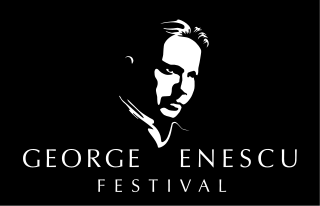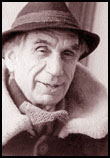Constantin-Nicolae Silvestri was a Romanian conductor and composer.

Constantin "Dinu" Lipatti was a Romanian classical pianist and composer whose career was cut short by his death from effects related to Hodgkin's disease at age 33. He was elected posthumously to the Romanian Academy. He composed few works, all of which demonstrated a strong influence from Bartok.

The National University of Music Bucharest is a university-level school of music located in Bucharest, Romania. Established as a school of music in 1863 and reorganized as an academy in 1931, it has functioned as a public university since 2001. It also offered training in drama until 1950, when this function was taken over by two institutes which were later reunited as the Caragiale National University of Theatre and Film (UNATC).
Paul Constantinescu was a Romanian composer. Two of his main influences are Romanian folk music and Byzantine chant, both of which he used in his teaching. One of his students was composer Margareta Xenopol.

Florica Musicescu was a renowned Romanian pianist and musical pedagogue, daughter of the renowned composer, conductor and musicologist Gavriil Musicescu.

Radu Lupu was a Romanian pianist. He was widely recognized as one of the greatest pianists of his time.
Myriam Marbé was a Romanian composer and pianist.

The George Enescu Festival, held in honor of the celebrated Romanian composer George Enescu, is the biggest classical music festival and classical international competition held in Romania and one of the biggest in Eastern Europe. Enescu's close associate George Georgescu organized the first festival in 1958; highlights included a performance of Bach's Concerto for Two Violins with Yehudi Menuhin and David Oistrakh as soloists and a staging of Enescu's sole opera, Œdipe, with Constantin Silvestri conducting.

Mircea Ștefan Gogoncea is a Romanian classical guitarist.

Mihai Brediceanu was a Romanian composer, conductor, and musicologist.

Ştefan Gheorghiu was a Romanian musician, violinist and teacher, born in Galați, Romania.

George Georgescu was a Romanian conductor. The moving force behind the Bucharest Philharmonic Orchestra for decades beginning shortly after World War I, a protégé of Artur Nikisch and a close associate of George Enescu, he received honors from the French and communist Romanian governments and lived to make recordings in the stereo era.
Valentin Gheorghiu was a Romanian classical pianist and composer. He is regarded as a leading Romanian pianist of the twentieth century, focused on both piano concertos of the Romantic period and chamber music. He won the prize for the best performance of Enescu's Violin Sonata No. 3 at the first George Enescu International Competition in 1958, with his brother Ștefan as the violinist. He made recordings with international orchestras and conductors.
Hilda Jerea was a Romanian-Jewish pianist, conductor, and composer. Born in Iaşi, she began her education at the Conservatory of Music in Iaşi and finished it in Bucharest where her teachers were Mihail Jora, Florica Musicescu and Dimitrie Cuclin. After graduation she pursued further studies in Paris and Budapest. She played the piano in concertos or chamber ensembles from 1936. Her best-known composition is the oratorio Under the Wake-Up Sun from 1951. She was distinguished with the State Prize of Romania and the Order of Labour.
Mindru Katz was a Romanian-Israeli classical pianist.

Alexandru Hrisanide was a Romanian pianist and composer who was a representative of late 20th century Romanian avant-garde. A Netherlands resident since 1974, he taught piano and composition at the Amsterdam and Tilburg Academies of Music. Hrisanide's music achieves an original synthesis between archaic melos and modes on the one hand, and the accomplishments of the modern Viennese school on the other. He won the Lili Boulanger Foundation Prize in 1965.

Ferdinand Weiss was a Romanian collaborative pianist and a professor at the Gheorghe Dima Music Academy of Cluj-Napoca, Romania.

Emil Simon was a Romanian conductor and composer.

Radu Paladi was a Romanian composer, pianist, and conductor. His compositions include stage and film music, choral works, vocal music and vocal-symphonic works, chamber music, symphonic music as well as concertos.
Dan Mizrahi was a Romanian-Jewish pianist.













